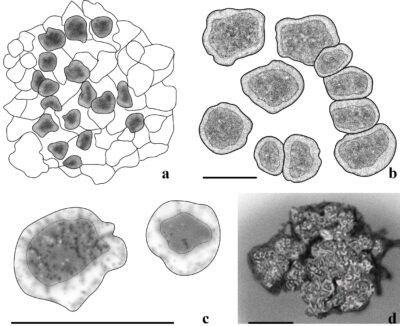Fungalpedia – Note 378, Catenarina
Catenarina Søchting, Søgaard, Arup, Elvebakk & Elix
Citation when using this data: Tibpromma et al. 2024 (in prep.) – Fungalpedia, Lichenicolous fungi.
Index Fungorum, Facesoffungi, MycoBank, GenBank, Fig. 1
Classification: Teloschistaceae, Teloschistales, Lecanoromycetidae, Lecanoromycetes, Pezizomycotina, Ascomycota, Fungi.
Catenarina was established by Søchting et al. (2014) within the Teloschistaceae, with Catenarina desolata identified as its type species. The delineation of Catenarina from other genera in Teloschistoideae was supported by multigene phylogenetic analysis involving nrITS, nrLSU, and mrSSU, as noted by Søchting et al. (2014). However, the precise placement of Catenarina within the Teloschistoideae remains uncertain. Catenarina currently encompasses three species: C. desolata, C. iomma and C. vivasiana. Its secondary compound, catenarin, is characterized by the production of apothecia and non-gray thalli that predominantly contain 7-chloroemodin, along with smaller quantities of emodin, 7-chlorocitreorosein, 7-chloroemodinal and 7-chloroemodic acid. Additionally, all species within the genus contain 7-chlorocatenarin and occasionally smaller amounts of catenarin. The known distribution of Catenarina includes the southernmost regions of Chile, Antarctica and the Kerguelen Islands, as reported by Øvstedal and Smith (2001), Olech (2004) and Søchting et al. (2014). These species represent a transition of species found on maritime rocks in Antarctica, typically occurring on rocks near the sea, forest outcrops, and near tree lines. Morphologically, Catenarina species exhibit a crustose thallus that can be saxicolous or lichenicolous, either thick or disappearing, and colored gray or reddish-brown. The apothecia are either sparse or abundant, zeorine with a reddish disc, and spores are polardiblastic (Søchting et al. 2014).
Type species: Catenarina desolata Søchting, Søgaard & Elvebakk
Other accepted species: Species Fungorum – search Catenarina
Figure 1 – Catenarina spp. a, b Thallus of Catenarina desolata (a = Elvebakk, b = M. Z. Søgaard 9). c Thallus of Catenarina iomma (Olech A081-14). d Thallus of Catenarina vivasiana (U. Søchting 10414). Scale bars: b-d = 0.5 mm. Redrawn from Søchting et al. (2014).
References
Entry by
Wanasinghe DN, Center for Mountain Futures, Kunming Institute of Botany, Chinese Academy of Sciences, Honghe 654400, China.
(Edited by Saowaluck Tibpromma, Samaneh Chaharmiri-Dokhaharani, & Achala R. Rathnayaka)
Published online 25 November 2024
